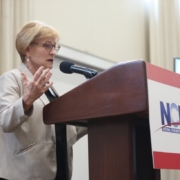Reversing Progress on Obesity Care
By Nancy Glick, Director of Food and Nutrition Policy
“One step forward, two steps back” describes situations where progress is hindered by setbacks. This accurately reflects the state of obesity care today.
On the positive side, the disease that now affects more than 100 million adult Americans is finally getting recognition as a priority health issue. This is due to several important developments demonstrating the value of treating obesity as a serious chronic disease:
There is widespread scientific consensus that obesity is a high-risk condition
Starting with the American Medical Association’s (AMA) action in 2013 to classify obesity as a serious chronic disease requiring treatment, numerous chronic diseases, obesity and nutrition organizations now agree that obesity is a distinct disease due to its complex biological mechanisms and its worsening effect on over 230 other chronic diseases. Based on this consensus, in 2024, the Centers for Medicare and Medicaid Services (CMS) issued a proposed rule to establish treatment of obesity as a medically necessary service under Medicare and Medicaid, paving the way for covering weight loss drug under these programs in the future.
New therapeutic agents are revolutionizing obesity medicine
When the Food and Drug Administration (FDA) approved the first GLP-1 (glucagon-like peptide-1 receptor) agonist to treat obesity in 2021, Americans learned that these injectable medicines could help people lose between 15 percent and 25 percent of their weight on average after one year. Thus, enthusiasm for GLP-1s has soared to levels rarely seen in medical practice. According to the findings of a 2024 survey of 3,000 adults commissioned by the professional services firm PWC, between 8 percent and 10 percent of US adults are currently taking GLP-1s.
GLP-1 medicines are cost-effective
In September, the Institute for Clinical and Economic Review (ICER) gave its highest cost-effectiveness rating to the widely prescribed weekly injectable GLP-1 weight loss drugs, semaglutide and tirzepatide, citing price reductions and studies showing cardiovascular benefits. Additionally, FDA recently approved the first generic version of an older GLP-1, liraglutide, which is injected daily.
New research shows that treating obesity lowers overall healthcare costs
Because even a modest weight loss (a drop of 5-10 percent) produces significant health improvements when a person has overweight or obesity, studies are beginning to project the potential savings to the economy from covering obesity medications. One large study of privately insured adults and Medicare beneficiaries published December 5, 2024, in JAMA Network Open estimated an annual savings of $2,430 per person who achieved a 10 percent reduction in excess weight and a $5,444 reduction in health expenditures with a 25 percent weight loss.
Reflecting these developments, coverage of GLP-1 drugs increased in 2023 and 2024, particularly among large employers. According to the firm Mercer, which conducts an annual National Survey of Employer-Sponsored Health Plans, coverage for GLP-1 drugs in 2024 rose to 44 percent of all large employers (those with 500 or more employees) and up to 64 percent of corporations with 20,000 or more employees.
Additionally, the Office of Personnel Management (OPM) required Federal Employee Health Benefits (FEHB) carriers to cover at least one GLP-1 weight loss drug in 2024, and the Civilian Health and Medical Program of the Department of Veterans Affairs (CHAMPVA) covered these medicines for chronic weight management. At the same time, several states provided some level of GLP-1 coverage for their employee health plans and 13 state Medicaid programs covered GLP-1 weight loss drugs as of August 2024.
But, as the saying goes, that was then, and this is now. Due to dramatic cuts in federal and state budgets, the nation is shifting course with the inevitable result of moving backwards in delivering quality obesity care. While not the complete picture, the National Consumers League notes these troubling reversals:
- Private insurers are increasingly reversing coverage for GLP-1 drugs for weight loss. In 2025, nearly 10 percent of people with commercial insurance – about 19 million people – lack coverage for any of the GLP-1 medications prescribed to treat obesity.
- In April 2025, the Trump Administration announced that Medicare will not cover anti-obesity medications, stating that the 2024 CMS proposal to cover GLP-1 weight loss drugs “is not appropriate at this time.”
- As of September 1, 2025, the Department of Defense dropped coverage for GLP-1 weight loss drugs for military retirees and family members on Tricare for Life. It also instituted restrictive eligibility requirements for active members of the military covered under all Tricare plans. Similarly, a September notice from the Veterans Administration informed the spouses, dependents, and survivors of certain veterans enrolled in the CHAMPVA program that the plan no longer covers GLP-1 drugs for weight loss.
- Citing budget concerns, several state retirement and employee health plans have stopped covering GLP-1 drugs for weight loss, including North Carolina, Ohio, and West Virginia. Additionally, the MassHealth program in Massachusetts now limits weight-loss coverage to specific drugs with prior authorization and requires patients to try other medications first.
- Recently, California passed a budget for 2025-2026 that eliminates Medicaid coverage for GLP-1 weight loss drugs, North Carolina issued a bulletin stating that its Medicaid program coverage will end as of October 1, 2025, and Michigan announced that in 2026 its Medicaid program will only cover GLP-1s if enrollees have diabetes or severe obesity (defined as having a BMI of 40 or greater). Due to the passage of The Big Beautiful Bill, which significantly cuts Medicaid funding to the states, more states will likely follow suit.
If obesity were cancer or heart disease, policymakers might think twice about not allowing access to cost-effective medications. Yet, the reality is that obesity is still not viewed as a serious disease. Thus, obesity remains largely undertreated in this country, due in part to payers, federal agencies, and state governments restricting or eliminating coverage for anti-obesity medicines that are changing the standard of care.
Recognizing that people with obesity deserve the same level of attention and care as those with other chronic diseases, the National Consumers League partnered with the National Council on Aging (NCOA) and leading obesity specialists to develop and issue the first Obesity Bill of Rights for the nation on January 31, 2024. Specifically, the Obesity Bill of Rights defines quality obesity care as the right of all adults and establishes eight essential rights, including the right to coverage for the full range of treatment options, ensuring that Americans with obesity recieve the care specified in medical guidelines.
To ensure Americans have these rights, NCL and obesity advocates are urging policymakers to adopt a long-term view about the importance of covering anti-obesity medications. Our message is simple: there may be short-term budget savings from restricting or eliminating coverage, but if obesity goes untreated among a large segment of the population, the nation will pay the costs in higher annual expenditures on obesity-related chronic diseases, disability, lost productivity, and premature deaths.
Complicating matters, not having insurance coverage is what drives many consumers to go online and opt for ‘cheap, easy, and doctor-approved’ compounded GLP-1 products that may cause harm or could be fakes. According to the Food and Drug Administration, these products may contain incorrect dosages, the wrong ingredients, excessive or insufficient amounts of active ingredients, or possibly bacteria, all of which can lead to serious health consequences. Thus, while several medical organizations and state attorneys general have issued alerts to warn consumers, advocates agree that providing coverage for FDA-approved GLP-1 drugs is the best way to put a damper on this exploitative market.
For all these reasons, NCL urges insurers and federal and state policymakers to consider the significant health and patient safety benefits, as well as the reduced medical expenditures from treating obesity, when weighing decisions about coverage.

























